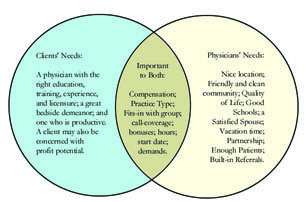By Heath Ponder and Terry Lane
Welcome to the first in a three-part series about physician compensation. Our experienced team at Pinnacle Health Group will explain what criteria is evaluated to find the “perfect match” between a candidate and an opportunity. We’ll talk about “Supply vs. Demand” in our May issue, and in June, we’ll provide “Tips from the Field”.
Starting Points
How is compensation determined? Physician’s compensation ranges are determined based upon specialty, size of community, and proximity to major metropolitan areas, among other factors. One method used to determine these ranges-which provide a low, median, and high range-are by national and regional salary surveys, which are published annually by a variety of sources, such as by the MGMA. The MGMA is only one of many sources that clients may refer to, as needed, to help them determine compensation ranges.
Taking these guidelines into account, clients advertise the compensation which they believe to be the most competitive and within their ability to pay. They are motivated to advertise a fairly high salary in order to attract prime candidates.
Heath Ponder, a Pinnacle Health Group recruiter, recommends: “It is important to have a (compensation) number established on the front-end. Salary range should be determined on a case-by-case basis, but you should have an idea upfront-before you interview.”
Characteristics Considered in Physician-Opportunity Matching
In looking at all of the characteristics that make up a good job-fit, some are attributed to the client’s needs, some to the physician’s, and some to both. All of the attributes, both “hard” and “soft”, may affect compensation. Certainly, the most important consideration involves the hard skills – if the hard skills are not adequate (education, training, experience), there is no match. Recruiter’s look at the candidate’s hard skills in print. Soft skills, on the other hand (interpersonal skills and personality traits), are distinguished through phone conversations and in-person meetings.

Clients’ needs vs. Physicians’ needs
How well a candidate fulfills the parameters of a given opportunity determines the likelihood of successful placement and a satisfactory compensation. Often, candidates assume that with the right education and experience, they are sure to be made an offer. Additionally, clients may feel if they are offering a great opportunity at a high compensation, their preferred candidate will accept their offer. These assumptions lead to surprise and disappointment when the offer is not made, or not accepted. Usually, what hasn’t been considered, are the other characteristics which are vitally important to good physician-opportunity pairing.
The physician may not have realized the importance of “soft skills” such as having a warm and friendly personality, great “bed-side” manner, an ability to work with peers (resulting in more referrals), and level of ambition. “Personality is critical,” says Ponder. “So many specialties are one-on-one. A great bedside manner is essential, referrals are important – a great personality is a key trait to bring to the opportunity.”
Likewise, the client may not have thought of characteristics that expand beyond the opportunity itself, such as how the candidate will fit-in to the community, if his or her spouse will be able to find a good job, if there are appropriate schools for the candidate’s children, and if the required religious institutions are available. These characteristics, which fall under the heading of “quality of life” cannot be overlooked. A candidate may refuse to accept a position because his daughter requires a school for the deaf, or because the nearest symphony and theater district is more than two hours away. This may, in turn, prompt the client consider offering a higher salary to the candidate to compensate for quality of life needs which will not be met.
Neither the client nor the physician should underestimate these “soft skills” or personal requirements. Clients and candidates can discuss these issues with their recruiter prior to the interview. Pinnacle Health Group recruiters are familiar with the market. They visit every opportunity in-person, and in addition to visiting the opportunity facility, they tour the community, and note the features and positive attributes that they feel a candidate would want to know about.
Your Pinnacle recruiter will be able to tell you what kinds of schools are in the area, and will be able to help you determine if the community has the attributes required by your family. “A good recruiter will know if a physician is a fit from the start. He/she will have done their homework, so the candidate and the client know ahead of time that there is strong interest from both sides,” said Ponder.
IN SUMMARY, it is important to consider all of the characteristics of an opportunity in order to determine which candidate is a “best-fit”. The better the fit, the more likely the candidate will swing to the higher end of the salary range, and the client will be satisfied that they have procured the best candidate for their position.
Recruiters can help candidates by giving them an in-depth understanding of the opportunity beyond the basic requirements. They can help a candidate to interview better – pointing out the candidate’s strengths and presenting him/her to the client in a professional manner. Additionally, recruiters can help clients by assisting them in advertising their opportunities with the information that attract the best candidates.
In part two, we will discuss supply vs. demand and how it affects compensation. We look forward to bringing you part two in next month’s newsletter!
Compensation Review, Part 2 of 3 (Supply Vs. Demand)
Compensation Review, Part 3 of 3 (Tips for Negotiating Salary)